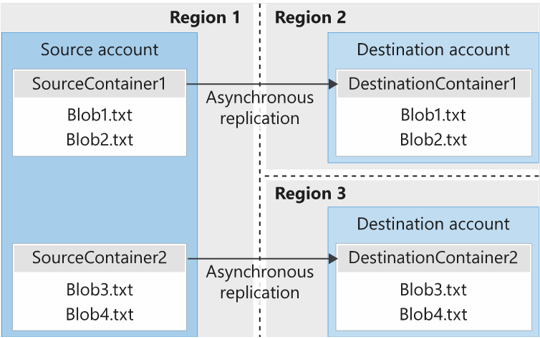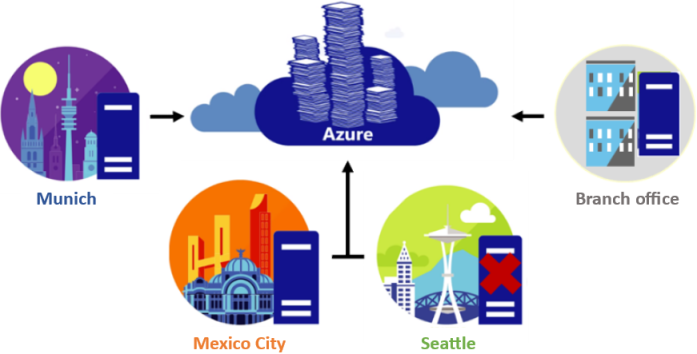Recent Score:
Take the Test again Go Home
Azure Storage Illustration Slideshow
1
Suppose you have two video files stored as blobs. One of the videos is business-critical and requires a replication policy that creates multiple copies across geographically diverse datacenters. The other video is non-critical, and a local replication policy is sufficient. Which of the following options would satisfy both data diversity and cost sensitivity consideration.
- Create two storage accounts. The first account makes use of Geo-redundant storage (GRS) and hosts the business-critical video content. The second account makes use of Local-redundant storage (LRS) and hosts the non-critical video content.
- In general, increased diversity means an increased number of storage accounts. A storage account by itself has no financial cost. However, the settings you choose for the account do influence the cost of services in the account. Use multiple storage accounts to reduce costs.
2
The name of a storage account must be:
- Globally unique.
- The storage account name is used as part of the URI for API access, so it must be globally unique.
3
In a typical project, when would you create your storage account(s)?
- At the beginning, during project setup.
- Storage accounts are stable for the lifetime of a project. It's common to create them at the start of a project.
4
Which storage type replicates data to a secondary region, maintain six copies of the data, and is the default replication option?
- Read-access geo-redundant storage
- Read-access geo-redundant storage is the default replication option. Geo-redundant storage (GRS) copies the data synchronously three times within a single physical location in the primary region using LRS. It then copies the data asynchronously to a single physical location in the secondary region.
5
The name of a storage account must be -------------
- Globally unique
- The storage account name is used as part of the URI for API access, so it must be globally unique.
6
A manufacturing company has sensors that record time-relative data. Only the most recent data is useful. The company wants the lowest cost storage for this data. What is the best storage account for the company?
- Locally redundant storage
- Tt's the lowest cost, the data is being continuously created, and data loss isn't an issue.
7
What is Storage Explorer?
- Storage Explorer is a GUI application developed by Microsoft to simplify access to, and the management of, data stored in Azure storage accounts. Storage Explorer is available on Windows, macOS, and Linux.
-
8
What are Azure Storage types?
- Azure Blob Storage. Blob storage is used to store unstructured data as a binary large object (blob).
- Azure Table Storage. Table storage is used to store NoSQL, semi-structured data.
- Azure Queue Storage. Queue storage is used to store messages in a queue, which can then be accessed and processed by applications through HTTP(S) calls.
- Azure Files. Azure Files is a file-sharing service that enables access through the Server Message Block protocol, similar to traditional file servers.
- Azure Data Lake Storage. Azure Data Lake, based on Apache Hadoop, is designed for large data volumes and can store unstructured and structured data.
9
When configuring network access to an Azure Storage Account, what is the default network rule?
- The default network rule is to allow all connections from all networks.
-
10
A company is planning a delegation model for the Azure storage. Apps in the production environment must have unrestricted access to storage resources. Which is the best course of action?
- Use access keys for the production apps
- Access keys provide unrestricted access to the storage resources, which is the requirement for production apps in this scenario.









